Note You are currently viewing a previous version of this narrative statement as published in previous iterations of the KEF (KEF1 and KEF2). View the latest version
Institutional Context
Summary
A “World Top 300 University Under 50 Years Old” in the Young University rankings, the University of Bedfordshire’s vibrant population includes more than 20,000 students from over 120 countries. We nurture students to become educated, employable and entrepreneurial global citizens and lead the way in expanding educational opportunity, with half of our students coming from lower socio-economic backgrounds or from families with no history of higher education.
We champion practice-based education with a strong vocational focus - our graduates have a 91% employment rate - and our externally driven Research and KE focus reflects our ethos and regional heritage, tackling real-world challenges faced by our communities and partners, helping them to thrive economically, culturally and socially.
Institutional context
Mission:
Our mission is widening participation for all, centred around the student experience. We deliberately avoid disparate strategies, instead we embed complementary learning, KE, research and public engagement strategies within one overarching Strategic Plan, aligned to our KE relevant themes of employability, socio-economic growth and improving productivity.
Themes such as “Engaging our people in innovation and development” and “Broadening understanding and horizons across the communities we engage” have a range of metrics/targets that are subsequently embedded across faculty and professional service operating plans. KPIs are reported through faculty executives, senior leadership and VC’s Executive Groups and biannually, to the University Board of Governors.
Our Strategic Plan delineates activities between research driven KE and wider civic/community engagement. Our community charter codifies our civic, partnership and community working. This is greatly encouraged in our staff/students, and our public engagement prompts excellent KE opportunities around the region’s skills and entrepreneurship agenda and more widely, within regional and national public policy, all aimed at employability and growth.
Our students are supported to engage in entrepreneurial and/or employability activities, embedded throughout each course, and we are guided by feedback from course representatives, whose involvement is enshrined in our Student Community Partnership Agreement. Faculty Employability and Enterprise groups monitor engagement and report bimonthly to the Vice-Chancellor’s Employability Action Group, with input from the University Court and is ultimately overseen by the Board. Extra-curricular student support for entrepreneurial/intraprenurial activity is driven by dedicated faculty/professional service staff, student-led societies and funded externally facing enterprise projects. We are 5th nationally for number of student start-ups.
Economic Context:
The University occupies a strategically important network of mid-sized towns conurbations, and rural areas at the centre of the OxCam Arc. SEMLEP has the 3rd highest start-up and survival rate, and houses 83,000 businesses, although 98.3% have fewer than 50 employees. Our region has particular strengths in electronic engineering, aerospace, creative industries, food and drink, manufacturing and logistics. We-supported SEMLEP to develop the Local Industrial Strategy as well as helping our county councils create development and Investment frameworks.
Institutional Strength:
For every £1 invested in R&KE, the University delivers £6.50 in regional GVA. We deliver our KE expertise to support growth, R&D and innovation to over 600 SMEs per year, and have the 10th highest revenue/CPD days of all UK HEIs, when adjusted per fte. Since 2017, we have attracted £18.4m in regional growth funding and delivered £70m in regional economic GVA. Beyond the private sector, we possess an exceptional reputation for supporting government and third sector organisations, particularly in health/social/educational-related policy and productivity.
KE Focus:
Our HEIF strategy is to “support the economic and social development of our region….and align our KE activity towards the private sector to enable economic growth…alongside societal improvements and public/third sector efficiencies.”
Our KE focus is on employer engagement (we have the largest regional offer of predominantly STEM related higher apprenticeships) and-growing private-sector R&D, which continually generates further KE opportunities, especially where such activity is primed through our involvement in successful regional regeneration projects.
For further information, please send queries to Andrew.Church@beds.ac.uk
Local Growth and Regeneration
Summary of approach
As a teaching focused mid-sized University without significant specialist science and technology infrastructure, our approach is to work with public and private organisations within SEMLEP in key areas to enhance the impact of our KE, rather than deliver everything as a sole provider.
We provide thought-leadership in KE policy, addressing national and regional KE drivers, help identify/set the region’s strategic agenda then take action to solve challenges. As a founder member of SEMU and the Arc Universities Group, having senior staff on national and regional boards, leading on Luton’s Inclusive Growth Commission and primary data capture, helping develop various Councils’ Local Investment Frameworks and engagement plans, we translate and address the region’s needs, predominantly through funded joint-programmes and policy engagement.
Aspect 1: Strategy
Geographical-area-and-regional-consultation:
Historically, our geographical area of KE importance centred around our main campuses in Luton, Bedford and Milton Keynes. Pre-2015, we partnered anchor organisations such as Vauxhall and Luton Airport, assisting their associated regional supply chains. In 2015, under the direction of a new VC and Board, the University formed the Research and Innovation Service (RIS) to better develop and drive KE.
To develop the Strategic Plan 2017-2020, initial activities involved identifying regional needs/partners using business survey data, ESIF and skills shortage data.
External partners (SEMLEP, Local Authorities (and regeneration teams) in Bedford, Central Bedfordshire, Luton and Milton Keynes, business/community organisations such as Bedfordshire Chamber of Commerce and Luton BID;
Business needs captured direct from organisations;
Geographic location, knowledge of emerging drivers. Locally; Local Investment Frameworks and economic growth commissions, regionally; Arc Universities Group and SEMU, nationally; challenges, initiatives and funding streams under National Industrial Strategy Grand Challenges, workforce development and higher and degree apprenticeships, globally; drivers such as UN’s Sustainable Development Goals and international funding through Horizon 2020;
Internal groups (Governors, University Court and Industry Advisory Panels) and internal capacity (Research Institutes);
Students - through SU consultations, we identified entrepreneurship and employability as a key aspiration.
Needs of the area(s) – analysis:
Our consultation revealed:
Internal - e.g. KE capacity needed training/assistance, Lack of structural support for funding bids, need for managed CRM, policies unclear/outdated and lacking ownership.
Sectoral - ONS/BIS Enterprise Analysis identified critical issues, for example, in small manufacturing-specialist companies within SEMLEP and in particular the lack of specific ICT/database management expertise hindering growth, an underserved STEM sector, a disproportionately large 3rd sector/public admin base. As part of Luton Investment Framework, arts and culture organisations were overly reliant on non-commercial income, an Eng-tech sector with an ageing workforce lacking IT skills (these led to programmes of upskilling and creative arts support and incubation).
Structural - e.g. many SMEs never grew beyond micro-scale versus the national average, with scale-ups (7.8% in SEMLEP) below national average (9.3% in 2017) and lacked investment in R&D.
Pan-Regional - working with external partners identified common regeneration issues; e.g. lack of wider business/management skills hindering SME growth, declining rates of innovation, the need for graduate work experience in retaining talent and SME reluctance to approach LEP/Local Authority.
Resulting strategic objectives:
Grow STEM entrants by 200 annually;
Develop funded projects to stimulate engagement e.g Innovation Bridge partnership with Central Bedfordshire Council, helping >200 SMEs to grow through innovation;
Concentrate KE effort on private sector with greatest potential to increase investment in R&D
Develop suite of CPD aimed at productivity for manufacturing, logistics, healthcare, govt and third sector and building internal STEM capacity to assist the STEM- sector;
To assist health, education and public administration sectors, frame our P&CE approach toward global challenges, better data and AI.
Driven by the identified needs of the region and the data capture activities outlined above, we developed the KE aims of our strategic plan, against which we measure in the Results section below.
Aspect 2: Activity
The following are some-examples of how we focused our approach and some of our internal/external activities-that-supported-it:-
Internal Activity:
Developed our process of engagement, encompassing the client journey, with sub-policies for KE, consultancy and external activity, contracts and IP.
Agreed >£3m of match-funding with the University for large ERDF business support partnerships
Invested in (predominantly) STEM-based facilities including bioscience and optical labs, healthcare suites etc.
Commissioned central CRM system, recording all external engagements, overseen by the Business Partnerships Unit responsible for growing the depth/breadth of relationships.
We train all new staff from induction through our R&KE Professional Practitioner programme: including academic/business relationships, delivering KPIs and project management, budgeting/reporting and KTPs. We ensure that professional staff are trained and qualified using PraxisAuril.
As suggested, entrepreneurship is a key pillar of our student experience offer, and enshrined in our Student Community Partnership Agreement. We developed a range of services, eg incubation units, student-centred companies (eg Media Junction and Guildford Street Press) and start-up support in collaboration with the private sector,
Preparatory workshops for graduates acting as KE interns in region’s SMEs.
Embedded our KE mission in curriculum, co-curricular and extra-curricular activities. The requirement to demonstrate employer-relevance and entrepreneurship is embedded in course accreditation where faculty reviews happen every 2 years.
Reflected student-led KE in our reporting structures; our central Careers and Employability Service reports directly to VC’s Employability Action Group.
Capture/monitor and report KE activity/KPIs from across Faculty and professional services, through a central Director, VC Executive Group and Board.
External Activity:
Organisations do not typically approach local authorities for support, so we hold regular roadshows in every local authority area and created a simple “front door” to business which we can then refer to LA or LEP if relevant.
Developed £18.6m of ERDF/ESF regeneration projects to meet the needs of the region, these include:
Higher Level Skills- imparting modern skills to an ageing workforce
TestBeds Arts incubator - supporting hundreds of arts businesses move toward commercialisation
ICT Escalator, with 150 SMEs receiving expert consultancy, in-house programming/development assistance and grants. Overall the project contributed an 8:1 GVA ratio, contributing toward our £6.50 GVA for every £1 spent with the University.
Innovation Bridges to encourage innovation especially in STEM, matched with further funding from OXLEP and GCGP
GrowthCurve in partnership with SEMLEP to help companies scale up.
Time2Grow to retain STEM-based graduate talent in region’s SMEs.
Alphas to help all sectors improve productivity through leadership
A programme of incubation, start-up and entrepreneurship support for students, academics and externals was trialled (B-Innovative) and then re-engineered for delivery with WENTA Ltd.
Helping develop Luton’s economic framework for 2040, joining the board of Luton Business Improvement District and the imminent formal appointment to the board of Bedfordshire Chamber of Commerce.
Working with SEMLEP on their Skills and EU Investment Framework Boards has led directly to skills/workforce development initiatives such as our business-driven range of Higher and Degree level opportunities and University/private sector partnerships such as our industry focused Lean Six Sigma,PRINCE2®, Agile PM® and Leadership and Management offers.
Meeting our identified needs
Regional and National bodies approved £18.6m of ERDF and ESF regeneration projects over the past 4 years - each designed to meet regional needs and outlined in independent assessment reports. This has massively increased the number of organisations we work with every year
SEMLEP’s Local Industrial Strategy referenced two of our regeneration projects as best-practice exemplars.
We collaborated with neighbouring HEIs through employer engagement projects such as Time2Grow and ALPHAS to achieve a wider regional impact
The increase of skills and knowledge in KE led to the University’s first awarded KTP and first EU-InterReg project within 18 months- with others subsequently following.
Latest HEIDI data shows the University in the upper quartile of graduate start-ups by estimated gross turnover, and 5th nationally by number.
We actively seek, and have been awarded, business-facing external validation such as Small Business Charter and the Business School Impact System.
Reflecting its strategic importance as a regional (and national) driver of economic growth, we became a founder member of the OxCam Arc Universities Group.
Social and Economic impact report established to help us better understand our on-going impact.
Aspect 3: Results
Our outcomes/impacts are best considered against each of our 3 main KE strategic aims:-
Strategic aim:- “Through funded programmes, use academic expertise to improve economic value through innovation, support graduate retention and the delivery of training for business”
The University commissioned an independent socio-economic evaluation- this was communicated to all of our external stakeholders . This showed that for every £1 spent on KE this leads to £6.50 in regional Gross Value Added for the region. The economic impact of one year's activity from business growth projects is over £18m net additional GVA, supporting over 350 full-time jobs.
Central Bedfordshire Council evaluated our regeneration impact in June 2019 and rated our collaboration as the authority’s highest functioning partnership “helping us create over 200 jobs in the region in such an incredibly short time.”
We are in the UKs top ten HEIs by revenue per fte for our programme of CPD and short course training for business.
Such external assessments complements specific evaluation and project assessments (e.g. ICT-Escalator), and allied with HEBCI data gives a rounded view of our R&KE impact. This is reported to the Board of Governors (and partners) and forms discussion/new directions for our annual business planning cycle.
Strategic Aim: “Enhance the volume and profile of R&KE associated with our STEM portfolio, working in partnership with businesses in the South East Midlands region”
Since 2017 we have worked with 2,493 organisations. Prior to this, without a central CRM systems we could not accurately state how many, however this is a massive increase.
With the development of our STEM building and a major revision of the range of the UG and PG courses we offer, beyond our traditional partnerships, we are engaging with more high profile STEM related businesses (e.g. Leonardo, Bosch, Easyjet) and several based outside SEMLEP (e.g. Cobham and BMW).
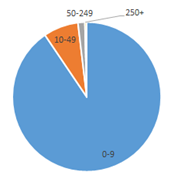
Figure 1 SEMLEP Business Size -no of employees Figure 2 UoB KE Client Business Size - no of employees
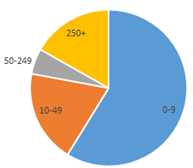
Figure 1 shows the breakdown in size of SEMLEP businesses and Figure 2 shows the size of businesses we have worked with over the last 3 years.
We complete more engagements with larger companies than the average SEMLEP profile, and through the development of our new Apprenticeship Programmes, we have engaged with more larger companies. Moving forward, the aim will be to identify/work with more larger R&D investing firms (and supply chains) and larger employers to support our employer engagement focus.
We have also increased our engagement with STEM-relevant sectors compared to SEMLEP business demographics. When we consider the ‘types’ of KE we have conducted, it can also be seen in figures 3/4 that most of our KE engagements are a function of our current research and teaching capacity/thematic strengths in applied computing, healthcare, lean manufacturing and scientific analysis, rather simply a reflection of the regional sectors.
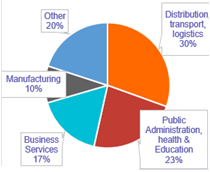
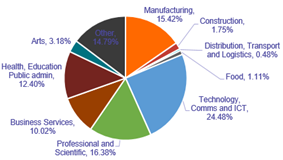
Figure 3 Sector Profile of SEMLEP business Figure 4 Functional profile of UoB engagements
In short, as a mid-sized institution with excellent (half of our research is rated world or international class) but relatively limited range of research capabilities, we do not possess the proficiency to support, for example, SEMLEP’s aviation or high-performance vehicle firms. This is addressed in the next section.
Two-way dialogue with our employer/business community continues to keep us informed about needs in areas of curriculum, employability and R&KE. We have also created 13 partnerships with other regional HEIs, especially those in our KEF cluster, to deliver local growth and regeneration.
As Figure 5 shows, from being predominantly campus area-focused, our footprint has broadened such that circ 75% of KE engagement now takes place across the wider SEMLEP area.
Figure 5 Geographic footprint by majority KE engagement
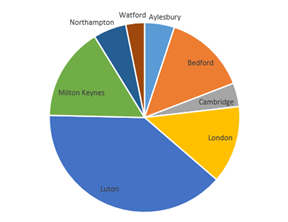
Strategic Aim: : “Ensure…plans for impact are designed into all R&KE …and that our academic workforce is equipped….in knowledge exchange”
Impact: Our KE activity has led to a wider discussion at Executive and Board level from/with industry. The sustainability agenda is an area we lack research expertise in. This informed our decision to establish our new Renewable Energy Innovation Centre - a co-funded and commercially focused institute with TWI Ltd to help increase our R&KE offer to industry.
Our commercial focus on the SEMLEP key sector of “creative and cultural” meant we were able to quickly help 31 cultural organisations hit by Covid.
Our upcoming 2021-24 Strategic Plan affords us the opportunity to reflect upon our wider institutional learning and teaching goals and overall mission, and their relationship to our research and KE capacity and impact. Developing new areas of impactful KE can be time consuming and expensive and requires much evidenced planning. It is hoped the outcomes from the KEF and REF assessments will greatly help us in our future preparation.
For further information, please send queries to Andrew.Church@beds.ac.uk
Public & Community Engagement
Summary of approach
Embedded within our Strategic-Plan, our P&CE approach is to ‘support our local communities, improving public service delivery, quality of life and civic engagement.’ We do this by understanding regional problems, shaping strategy, delivering operational interventions and monitoring outcomes.
With noted strengths in public health/social policy, sustainability, creative arts, sports science, and business management, we are informed by our communities and gather primary data through our embedded involvement in local authority/group consultations such as Local Action Groups, Inclusive Growth Commissions, Regional Economic Planning, and Public Health Consultations.
To maximise impact, within our business planning cycle we have developed 13 engagement commitments with KPIs against regional needs in our Community Charter, all monitored by our Governing Board.
Aspect 1: Strategy
We developed our Strategic Plan through wide consultation with our communities, formal groups, public debates and collaboration events. It outlines P&CE as a fundamental element of the wider R&KE, learning and student experience landscape. Additionally, we identified the needs of local community groups through our Research Institutes, that are deeply embedded in our local region, through community-focused projects (e.g. Institutes of Health Research and Applied Social Research). A rolling series of public lectures and events and our active University Court also provided a 2-way public engagement dialogue.
The measures of success agreed with our partners such as the “total volunteer hours” and “growing our socio-economic impact against …baseline” became fully developed and operationalised through our Community Charter. The Charter, launched at Speakers House, outlines 13 areas of commitment that influence operational faculty/professional service plans.
The Vice-Chancellor has P&CE as a direct portfolio accountability and works closely with the DVC Academic to operationalise engagement. We evaluate activity within faculty and professional services, and in turn report to the Vice Chancellor’s Executive Group and up to Board level as part of Board monitoring duties.
With ‘student experience’ at the heart of our mission, we understand that students gain valuable learning and experience helping deliver community assistance. Through consultation with BedsSU, we enshrined our students’ civic commitments in our community partnership agreement.
We facilitate community engagement through standardised processes with easy points of entry and resource these through 5 streams (funded projects, non-funded projects with manager accountabilities, staff time, VC-funded STEPS projects and Central Service support). We do not allocate specific amounts from HEIF; as we suggest in our 2016 strategy, P&CE “widens our impact in more than KE, and develops pipelines of other opportunities …which add value to research activities”. Thus, activity is captured/supported in the same way - centrally by Research and Innovation Service (RIS).
The £500k discretionary Vice Chancellor’s Student-Experience-Projects (STEPS) fund is available to kick-start longer-term public engagements such as the Refugee Legal Assistance Project or the Diabetes Clinic.
Aspect 2: Support
Practical support is given for voluntary works via contractually agreed staff hours in our benefits policy. Typically it manifests as involvement in advisory/governance roles for public/community organisations (for example as Advisor on Arab media or an Advisory Board member at NIHR). We also fund public events within normal business planning cycle/workload models.
P&CE often forms part of externally funded (typically with University match-funding) R&KE projects such as combatting air pollution, developing frameworks to safeguard children or creating art for social inclusion. Again, this is supported by our standard workload model.
A central support team assists staff with P&CE horizon scanning/applications for funding opportunities in relevant areas that impact on our local communities (e.g. arts, culture, sport and health). This team also assists various regional groups with applications for local funding from BLCF, Steel and Harpur Trusts.
Our Professional Practitioner training improves staff effectiveness when working with the third sector and we use our University-funded RadioLab to inform and upskill staff, students and the publics they reach. We train students specifically in civic areas they engage with as well as more general employability workshops, volunteering support and opportunity matching.
Community engagement is celebrated as an integral part of courses, as an element of research dissemination and as a method of engaging alumni .
The Vice Chancellors Office recognises our P&CE in-internal/external newsletters, celebratory events, staff awards such as the Volunteers Week and the Sports awards, nominating and complementing local recognition/national awards.
The annual Lord Lieutenant’s Community Engagement Award recognises work of individuals or groups-of-students-who make a tangible contribution to communities within Bedfordshire and have advanced the mission and values of the University, and our honorary awards are conferred on those who specially make a distinguished contribution to society.
Aspect 3: Activity
We ensure activities meet identified needs by involving those external partners who helped identify the needs, and monitor these in our internal project audit process. For voluntary projects, we collect feedback from project leaders, feeding into our strategic/faculty plan metrics.
The University undertakes a variety of public and community activities and Research Institutes develop annual programmes of public engagement and dissemination that ‘inspires our staff, students and external publics’, all guided by our student partnerships and community charters.
The focus of our approach to the social, economic and cultural wellbeing of our communities is the 13 commitments within our community charter:-
Expanding Higher Education Opportunities
We work with schools, colleges and local government to ensure accessible pathways into education and employment for all young people. For example, part of our STEM building was created specifically for community outreach. We collaborate on AspireHigher for prospective students and run summer activities for 8-12 year olds with the Level Trust.
Championing Social Justice
Our researchers aspire to help those without a voice such as the disabled, immigrant communities and refugees, victims of genocide and abused young people. We host roundtables to highlight child migration legal issues, and brought years of social justice research into the Black Lives Matter debate. Students, overseen by academics, offer free public housing, consumer and employment law services.
We comply with modern day slavery (MDS) policies and assist every organisation we engage with to become fully compliant in terms of MDS, sustainability, equality/diversity policy. Our data shows that our academics have influenced over 2000 policies aligned to our strategic goals and institutional strengths.
Supporting Culture and the Arts
Our wide-ranging arts incubation and entrepreneurship programme complements our trusteeships with Luton Culture and Cinema for All, mentoring schools in theatre-making and finding skill-creating opportunities.
Fostering an International Outlook
Our nationally recognised Go Global programme prepares students to work in global marketplaces, bringing international perspectives to our employers. Students engage in international youth leadership programmes and participate in the Global Game Jam, whilst our academics provide thought-leadership for, for example, UNESCO.
Nurturing Critical Citizenship and Civic Engagement
Students take on leadership roles throughout the University including participating in Vice Chancellor’s Executive Groups and Board of Governors. Student engagement includes unfunded work by the National Centre for Cyberstalking Research which was used to train student peer leaders, leading to projects with OfS, which in turn informed the Law Commission’s Harmful Communications Paper.
Practising Environmental Sustainability
The University ranks 8th in the country in the national People and Planet University League. We are nationally recognised for embedding sustainability into the curriculum through innovative events bringing together students, academics and the wider community and our commitment spans activities from academics acting as international climate ambassadors to our free bicycle scheme.
Delivering Professional and Entrepreneurial Education
We are a top10 university of graduate start-ups. Our practical approach to learning ensures that our graduates demonstrate entrepreneurial intelligence and make a real difference in business, the public sector or civic life. Entrepreneurship is embedded within courses, and our collaborative education projects have helped support 400 Lutonians, 350 Bedfordians and 400 more across the region into self-employment.
Enabling public engagement with policy and research
Our annual Vice Chancellor’s Public Lecture series brings together national figures from politics and journalism to share unique insights and BedsTalks provides the public with accessible and engaging research insights on current societal issues. For example, our academics developed a programme of better 3rd sector governance assistance.
Contributing to Community Cohesion
Alongside Bedfordshire Police awards for community cohesion, we work with all faiths to foster community dialogue and celebrate diversity. Our researchers engage with many community-centric projects including organ donation, pregnancy and female genital mutilation, and take on roles such as Chair, Transplant 2020 Stakeholder Group and National Member, British Medical Association Ethics Committee.
Growing Skills for the Region
We have a large workforce skills programme of higher and degree-level apprenticeships in partnership with, for example, Tesco and BMW and offer a range of professional training and development courses, internationally recognised, for example, by the Chartered Management Institute and the International Association of Six Sigma Certification.
We developed Time2Grow to retain regional graduate skills, leading 35% of participating graduates progressing to full time employment within the region’s SMEs. This followed our ICT Escalator programme on digital skills which mirrored other stakeholder needs.
Promoting public wellbeing through health and physical activity research
We tackle a wide range of health and wellbeing issues. Sometimes it is students tackling mental health in schools or staff/students offering free public diabetes control sport clinics. Staff offer expert neonatal training online during lockdown, working with the Citizens Advice Service to develop new covid-safe public help, helping injured police officers back to front-line health or preventing the spread of Covid-19 with Behavioural Science approaches.
Providing Space for the Community
Our Venue Bedfordshire events team handle enquiries from several hundred community organisations/members of the public every year. We also provide subsidised community access such as annual residential space for the National Citizen Service, and offer discounted access to third-sector groups (e.g. Luton-based charity NOAH’s annual conference, International Women’s Day and Holocaust Memorial Day).
Engaging Stakeholders in Knowledge Exchange
Through IES, we deliver regional business support programmes worth >£18m to businesses, 3rd sector and public services and work with regional partners to attract investment, enhance business productivity, develop management and leadership skills and create new products/services.
Aspect 4: Results and learning
Each of our 13 P&CE commitments have SMART targets which are monitored biannually and contribute to the Strategic Plan targets:
Grow our socio-economic impact: In 2020, as a primary method to capture the outcomes of key activities or programmes, and the extent to which they have met their objectives, the University commissioned a socio-economic review of our impact in the region with Hatch-Regeneris Ltd. It is our intent to make this an annual report and, acting on advice from our Court and Governors, it will expand to include attitudinal survey of businesses, community groups and civic institutions.
Contribute 50,000 volunteering hours annually: Our students contribute ~45,000 volunteering hours annually to their community, and we aspire to grow that number to 50,000 by the end of 2020. We are currently revisiting how to ensure better quality data.
Average 5% increase in our relevant HEBCI-measured R&KE income, as a proxy for indicator for P&CE opportunity. We have achieved 6% growth per annum.
HEBCI data collection processes allow us to monitor how our unpaid/paid engagement leads to an economic value through local growth and regeneration, the HESA data shows we have seen a 30% growth in value of engagement over the duration of our strategic plan through structured engagement in P&CE.
Aspect 5: Acting on results
Client feedback is reported at University’s R&KE/Higher Degrees/Portfolio Planning committees as well as faculty executive planning groups for action where appropriate. From our >600 business engagements every year we collect client testimonials and feedback documents. Over 90% of our clients rate us as 10 out of 10 for customer satisfaction against agreed aims/goals.
Internal feedback is collected through either staff survey or notification forms, capturing everything from feelings of motivation to paramedic volunteering at Stoke Mandeville Hospital. Although historically disseminated via our newsletter, website and to local media, this was not reaching a wider audience and lacked external scrutiny.
Lessons:
It is important to recognise the value of non-paid KE and in particular how P&CE may impact academic careers.
Civic responsibility is an important factor in student choice, so we intend to expand the future socio-economic impact survey to include a more developed set of metrics.
We are increasingly working with regional partners to disseminate results so that we can all learn and celebrate mutual achievements and have appointed key senior staff to work with the civic universities network to learn from best practice.
Looking ahead:
Our 2017-2020 strategic plan has reached end of life, and the University is in the process of appointing a new VC at time of writing. The interim VC has made P&CE a fundamental part of her portfolio, sits on the regional inclusive growth board, and is encouraging other senior staff to take up similar roles.
The strategic-process of-formulating our new mission begins in 2021, after completion of an institution-wide review of the effectiveness of the previous strategy and KEF feedback
For further information, please send queries to Andrew.Church@beds.ac.uk